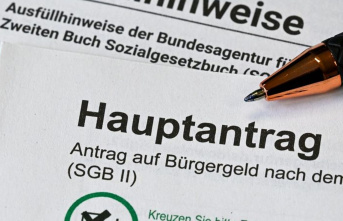Germany wants to become climate neutral by 2045. The EU wants to be there by 2050. Berlin should achieve this goal in seven years - if the initiators of a referendum that is unique in this form have their way. On Sunday, Berliners can vote on whether there should be significantly more speed on the way to climate neutrality in the capital. The "Climate Reset" alliance spent months collecting signatures and enforcing the vote.
So far, according to the Berlin Energy Transition Act, it has been planned to reduce climate-damaging carbon dioxide emissions by 70 percent by 2030 compared to 1990 and to become climate-neutral by 2045 at the latest. However, the initiators of the referendum are not going fast enough. They call for a commitment to at least 70 percent reductions by 2025 and at least 95 percent by 2030.
Climate neutrality in a few years - unrealistic?
Climate neutrality in Berlin in just a few years, i.e. hardly any emissions from combustion cars, airplanes, heating systems, power plants or industrial companies? The red-green-red Berlin Senate had declared this to be unrealistic and rejected the change in the law called for in the referendum. He argues that Berlin cannot single-handedly achieve climate neutrality 15 or 20 years earlier than the federal or EU level. In the state parliament, all factions voted against the concerns of the initiative. Berlin's CDU state leader Kai Wegner spoke out clearly against the goals of the referendum on Friday. "We have a responsibility for the future of this city, and of course it's about climate protection," said Wegner, who is likely to become the new head of government, on the sidelines of the coalition negotiations. "But we also have a responsibility for the affordability of this city, we have a responsibility for security of supply when it comes to energy." Berlin's still-ruling mayor Franziska Giffey shares Wegner's assessment: "We think it's important that the topic is promoted, but it's not possible for Berlin to be climate-neutral by 2030. And you have to explain that to the people in no uncertain terms. Everything else is window dressing," said the SPD politician.
Many people in Berlin seem to see things differently. In the weeks before the referendum, Fridays for Future and other climate protection groups, for example, showed solidarity with the issue, such as the tenants’ association, workers’ welfare and certain entrepreneurs, including the Greens and the Left. Widespread support came from cultural workers, who put together a large demonstration and concert in front of the Brandenburg Gate with a number of stars for Saturday. Organizers and the police expect tens of thousands of participants.
High voting hurdles
In the voting on Sunday, however, the hurdles are quite high. Because it is not enough that the proponents are in the majority. For the stricter law developed by the initiative to come into force, at least 25 percent of the 2.4 million eligible voters must vote yes. That's around 608,000.
When it comes to the question of whether climate neutrality can be achieved at all by 2030, there is a lot of skepticism in science. In a study commissioned by the Senate in 2021, the Institute for Ecological Economic Research (IÖW) in Berlin came to the conclusion that climate neutrality in the capital could not be achieved before 2042. The scientist at the Potsdam Institute for Climate Impact Research, Fritz Reusswig, also believes that a climate-neutral Berlin by 2030 is not feasible.
However, he is not the only one who still considers the political signal of a successful referendum to be important so that politics on the subject of climate protection can get going more quickly. The most important adjustment screws on the way to climate neutrality are well known: energetic refurbishment of buildings, fossil-free energy and heat generation, expansion of public transport and emission-free cars, especially with electric drives. In Berlin alone, this would require investments in the tens or hundreds of billions - regardless of the annual goal of climate neutrality.
The vote takes place just six weeks after the repetition of the House of Representatives elections - and in the middle of the coalition negotiations between the CDU and SPD. The two parties want to form a new black-red state government in Berlin. They announced that they intend to spend at least five billion euros on more climate protection in the city in the coming years. Critics accused both parties of wanting to take the wind out of the sails of the referendum with the announcement of the billions in investments.
More ambitious climate goals: Berlin is not alone
Berlin would not stand alone as a city with more ambitious climate goals. According to the German Zero association, around 70 cities in Germany from Munich and Münster are aiming to become climate-neutral by 2035 at the latest. Even if Berlin isn't the first city to go this route: "The capital can be a lighthouse for 3.6 million people that shows the transformative power of cities - and of their citizens," says Managing Director Julian Zuber .
At the European level, the EU Commission is supporting 100 municipalities that will take part in the "EU Mission for Climate-Neutral and Smart Cities" by 2030. One of them is Copenhagen. The Danish capital sees itself as a pioneer when it comes to climate protection. For a long time, it even advertised that it would be the first capital in the world to be climate-neutral by 2025. However, Mayor Sophie Hæstorp Andersen had to give up the goal last summer. The hope now is to be carbon neutral by 2030.
Other municipalities in the EU program are not ready yet. According to the environmental organization Legambiente, Italy's cities, including Rome, are still a long way from the goal of becoming carbon neutral by 2030.











